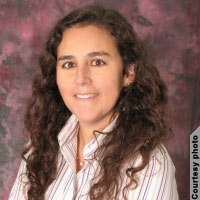SPACE EXPLORATION | Expanding the boundaries of human understanding
29 July 2008
Global Health Peru

Patricia Garcia, MD, MPH, is a Principal Professor in the School of Public Health at the Universidad Peruana Cayetano Heredia in Peru and Chief of the Peruvian National Institute of Health.
At my university we are working to develop a global health framework and train a new generation of health scholars and investigators, doing so with the support of the Global Health Initiative of Fogarty International Center.
My colleagues - Dr. Eduardo Gotuzzo, Dr. Hector Garcia, and Dr. Bob Gillmann -and I at Cayetano Heredia are designing a multidisciplinary program related to global health and infectious diseases that includes people from the schools of medicine, public health, science (biology, chemistry, and mathematics), and mental health. We are also involving colleagues from other fields who have much to contribute to the study of the broad social and economic issues that relate to health. Specialists in social science, education, veterinary science, and dentistry are involved in our program, as are economists, sociologists, lawyers, and health communicators.
We aim to offer a master's degree in global health for our undergraduate students, and we invite people from other countries to come and learn about public health issues in global health in the particular environment that surrounds our institution.
Our Global Health Demonstration Program here in Peru was the only program outside the United States that Fogarty fully funded for three years.
In training a new generation of health scholars at Cayetano Heredia University, we want to strengthen the translation of research into health policies and practices, and enhance the contribution and participation of developing-country researchers to the global health agenda. We basically propose to develop a multidisciplinary global health curriculum for undergraduate and graduate students and create a master's degree in global health, initially with emphasis on infectious diseases but also on other areas we consider important, such as chronic diseases.
We also want to design and implement distance-learning programs, expand international faculty exchanges, and develop global health expertise at our university that is not currently available in Peru.

We have almost finished the first year of the program. The idea was to develop an administrative system that would allow different schools within our university to work together - which is usually very complicated in one institution - and have curricula that allow students from different schools to take courses together to promote multidisciplinary approaches.
This year we also launched our Web page (http://www.globalhealthperu.org) and two pilot courses - Foundations in Global Health and Basic Concepts in Global Health. In July 2006, we finished Basic Concepts in Global Health, a weeklong course for undergraduate students that includes the participation of different professionals. It's a broad approach to global health that covers economic aspects, social aspects, different diseases of global importance, and fieldwork. We go up to the Andes Mountains for a day so students can put together issues of health and the environment. Next year we plan to extend the course to two weeks and open it to international students.
Another project completed in our first year was an international conference, the First International Conference on Health Problems With Global Impact and Relevance, held in August 2006 in Lima, Peru, for health sciences students and professionals.
For our second year, which started in September 2006, our goal is to organize our master's degree in global health and promote research in global health as part of the program. That will also be part of the third year. Both years will have international students - the interaction between international students and national students is key for the issue of global health.
The Taiwan government provided funding to launch the Peruvian health portal (http://portal.globalhealthperu.org). It is for people who are interested in coming to Peru or learning about diseases located geographically in Peru. Right now we describe only infectious diseases, but our idea is to eventually include mental disorders and other issues. We have health recommendations for travelers and are creating a database of studies of different diseases in Peru by Peruvian researchers.
The course on Foundations in Global Health is an open course for graduate students and has about 80 students. The idea of this course is to evaluate interest in these topics and create a forum for discussion of global health issues. At the end of the course, the students will present monographs on global health issues, and we will publish the best papers in a book that will be out in January 2007.
It's a great opportunity that we are able to promote the development of global health, interaction between researchers from other nations and Peruvian researchers, and the interests of undergraduate and graduate students in global health.
I would like to invite students from other countries who are interested in the program to visit our Web site and learn about how to participate in these courses and, eventually, in the research that will be done through this program.
The opinions expressed in the preceding articles do not necessarily reflect the views or policies of the U.S. government.
From the October 2006 edition of eJournal USA.
